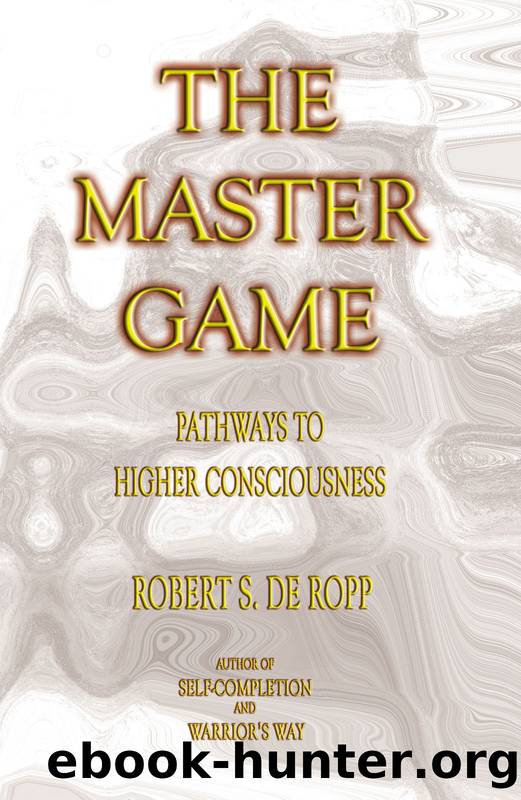The Master Game: Pathways to Higher Consciousness (Consciousness Classics) by de Ropp Robert S

Author:de Ropp, Robert S.
Language: eng
Format: epub
Publisher: Gateways Books & Tapes
Published: 2003-04-02T00:00:00+00:00
Problems of Balance
This brief review of Sheldonâs typology hardly does justice to the system. It has in it several elements which must be separately evaluated to give a full picture of type. The most elusive of these elements, one of great importance to every student of Creative Psychology, is the capacity to harmonize conflicting traits in temperament. The higher the total of the index of temperament and the more equally it is distributed among the three components, the greater is the potential of the individual. Thus a 3-7-2 and a 4-4-4 both have a total of 12, but of the two the 3-7-2, with his predominant somatotonia, may have an easier temperament to integrate than the 4-4-4. The latter may be pulled in so many different directions that he may end by achieving nothing at all. Such types often take refuge from their conflicts by stupefying themselves with alcohol, taking drugs or deliberately adopting a mediocre disguise. T. E. Lawrence (âLawrence of Arabiaâ) reacted in this way when, rejecting all the roles made available to him by his natural power of leadership and heroic aura, he took refuge in the anonymity of the R.A.F. as âAircraftsman Shaw,â exclaiming: âthere is nothing more restful than taking orders from fools.â
An exceptionally rich temperamental endowment results in âPrometheanâ or âFaustianâ man, a type perfectly exemplified by Goethe. This complex genius, who played the roles of scientist, administrator, traveler, poet, artist, lover and mystic with equal enthusiasm, whose surging torrential productivity would have sufficed to supply three lesser geniuses, was practically torn to pieces by his own conflicting elements. âAlas, two spirits dwell within my breast, the one forever fighting with the other.â Faust is not satisfied with little Gretchen whom he seduces and abandons. He must have Helen herself, he must be master of the Sign of the Macrocosm and of the Microcosm. âFrom heaven he demands the loveliest stars and from the earth each joy it has to offer, and all thatâs near and all thatâs distant wonât satisfy his fathomless desires.â69
Such is Faustian man. Goethe, after several close calls with both madness and suicide, managed to live to the age of eighty-two and leave behind him collected works which fill 150 volumes. The fact that he was able to do this was due, undoubtedly, to an understanding of the principals of Creative Psychology which he obtained early in life and which guided him afterwards. The whole of Faust is a treatise on this subject, one of the richest in all literature but, like so many works of this kind, intelligible only to one who âknows the language.â Other Faustian men who have not had this guiding light have been less fortunate.
The aim of Creative Psychology is to give the student an understanding of his essence. Once he really knows his type, he can estimate accurately his innate capacities and live within the limitations they impose. A 7-1-1 index of temperament should inform its possessor that his greatest danger lies in his
Download
This site does not store any files on its server. We only index and link to content provided by other sites. Please contact the content providers to delete copyright contents if any and email us, we'll remove relevant links or contents immediately.
The remains of the day by Kazuo Ishiguro(7577)
Tools of Titans by Timothy Ferriss(6968)
The Black Swan by Nassim Nicholas Taleb(6205)
Inner Engineering: A Yogi's Guide to Joy by Sadhguru(5914)
Giovanni's Room by James Baldwin(5896)
The Way of Zen by Alan W. Watts(5813)
The Six Wives Of Henry VIII (WOMEN IN HISTORY) by Fraser Antonia(4800)
The Power of Now: A Guide to Spiritual Enlightenment by Eckhart Tolle(4771)
Astrophysics for People in a Hurry by Neil DeGrasse Tyson(4628)
Asking the Right Questions: A Guide to Critical Thinking by M. Neil Browne & Stuart M. Keeley(4600)
12 Rules for Life by Jordan B. Peterson(3747)
The Ethical Slut by Janet W. Hardy(3512)
Skin in the Game by Nassim Nicholas Taleb(3480)
Housekeeping by Marilynne Robinson(3421)
The Art of Happiness by The Dalai Lama(3391)
Double Down (Diary of a Wimpy Kid Book 11) by Jeff Kinney(3286)
Skin in the Game: Hidden Asymmetries in Daily Life by Nassim Nicholas Taleb(3273)
Walking by Henry David Thoreau(3238)
12 Rules for Life: An Antidote to Chaos by Jordan B. Peterson(3209)
